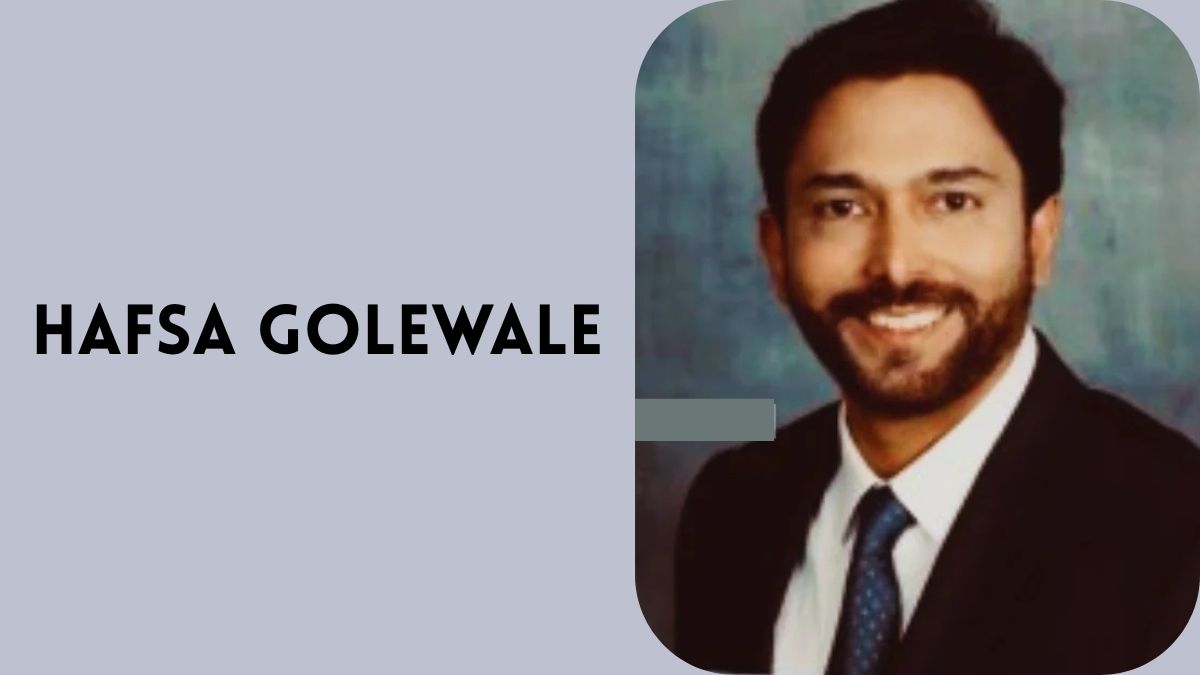Introduction
Few names in today’s whirlwind landscape of changemakers sparkle with the quiet force that hafsa golewale brings. At once audacious and unassuming, hafsa golewale has cut a singular path through the twin worlds of social enterprise and cutting‑edge technology, earning accolades that span continents. In an era hungry for fresh voices and original visionaries, hafsa golewale is the kind of figure who rewrites expectations simply by showing up.
Her story doesn’t begin in glossy boardrooms or on marquee stages, but in a modest two‑bedroom apartment in Pune, India. Yet from that bubble of tradition and academic rigor, she emerged with an appetite for disruption. Today, at just thirty‑two, her platform for educational equity supports thousands of underprivileged children, while her speaking‑circuit calendar reads like a map of global thought‑leadership hubs. Onstage, hafsa golewale fuses data‑driven insights with a storyteller’s warmth, turning dry statistics into stirring calls for equity. Peers and protégés alike recall her uncanny ability to turn a simple anecdote into a rallying cry: that progress begins when barriers meet bold ideas.
But biography alone cannot capture the undercurrents of curiosity and compassion that define her trajectory. Beneath each milestone, you sense a restless mind calibrated to ask: how can we do better? Through these pages, we’ll trace the unmistakable arc of hafsa golewale’s journey—from early influences to her boldest breakthroughs—exploring the grit, grace, and guile that add up to a life far larger than a résumé can convey.
Early Life and Family Roots
Born in August 1992 in Pune, hafsa golewale was cradled by a family whose dinner‑table conversations oscillated between Mahatma Gandhi’s philosophy and the latest discoveries in cognitive science. Her father, Rajendra Golewale, taught modern Indian history at a local college, while her mother, Shabana Golewale, ran a neighborhood tutoring center for under-resourced students. In that two-bedroom flat lined with dog‑eared textbooks and scattered manuscripts, hafsa learned that questions mattered just as much as answers, and every idea deserved a fair fight. By age seven, she was fluent in Marathi, Hindi, and English, effortlessly switching among languages as she devoured stories of ancient civilizations and speculative futures.
Even as a child, hafsa golewale displayed a restless curiosity. Weekends found her dismantling old radios to peek at the circuitry or trailing her grandmother to the village’s tiny library—a silent sanctuary of faded journals. By eleven, she was writing mini‑essays on global education challenges, a hobby her parents applauded but classmates found perplexing. Those early impressions of community, culture, and the power of knowledge laid the groundwork for her later commitments.
Her teenage years brought a scholarship to St. Mary’s Convent School, a prestigious all‑girls institution teeming with ambition. There, hafsa Golewale balanced academic rigor with cultural activism—leading book drives, organizing debate tournaments, and in stolen moments, teaching herself rudimentary coding. It was in those echoing corridors that she first glimpsed the possibility of blending empathy with innovation, a synergy that would become her professional lodestar.
Academic Pursuits and Intellectual Awakening
Upon graduating from St. Mary’s with top honors, hafsa golewale earned a merit‑based scholarship to the University of Delhi, where she pursued a dual degree in sociology and computer science. Immersed in academic debate halls and buzzing coding labs, she gravitated toward questions about how data could illuminate social inequality. As president of the campus’s Data for Good Society, she organized workshops that bridged technologists with grassroots activists. Her senior capstone project—a mobile app called EduBridge that mapped scholarship funds across underrepresented communities—garnered praise for its intuitive design and was featured in the university’s tech journal.
Eager to expand her horizons, hafsa golewale secured admission to Stanford University’s Master of Arts in Education program, backed by a full-ride fellowship for global changemakers. Nestled in Silicon Valley’s innovation ecosystem, she co‑founded the Stanford Changemakers Collective to mentor high schoolers in coding and design thinking. A stint at a leading AI research lab taught her to blend machine learning with human‑centered design, ensuring algorithms served people, not the other way around. She also published opinion pieces in the Stanford Review on the ethics of algorithmic learning.
Her master’s thesis, “Digital Equity: Designing Inclusive Learning Ecosystems,” became a touchstone in academic circles. In it, hafsa golewale argued that equitable access to education required more than hardware donations—it demanded community‑driven platforms, culturally responsive curricula, and real‑time feedback loops. The thesis earned her the Excellence in Innovation Award, was published in the Journal of Educational Technology, and presented at the 2021 World Education Forum in Paris. These milestones not only bolstered her credibility but ignited her drive to translate academic insights into scalable social impact.
Career Beginnings: Breaking Into Social Enterprise
Armed with her academic laurels, hafsa golewale returned to India in 2020 to launch EdConnect, a social enterprise aimed at closing the digital divide in rural schools. With seed funding from the Infosys Foundation, she assembled a lean team of developers, educators, and local community organizers. The inaugural version of EdConnect rolled out to ten pilot schools, offering a hybrid offline‑online curriculum packet that ran on low‑bandwidth connections. The first six months were fraught with power outages, skeptical principals, and software bugs that froze mid‑lesson. Yet each setback only sharpened her focus.
By the end of year one, EdConnect had refined its platform based on field feedback: lessons automatically adjusted to local dialects, and offline content synced seamlessly whenever a connection flickered to life. The breakthrough came when a remote school reported a 45% uptick in student engagement within weeks of adopting the program. News of this success traveled fast; within eighteen months, hafsa golewale had scaled EdConnect to over 150 schools across three states.
But she didn’t stop at distribution. Recognizing that technology alone couldn’t teach empathy, hafsa built a peer‑mentorship module that paired urban university volunteers with rural students via weekly video calls. The result was a budding community of learners, each bridging two worlds and fueling one another’s ambitions. In these humble exchanges, hafsa’s vision of a digitally inclusive future found its heartbeat.
Landmark Projects and Signature Achievements
Seven years into her career, hafsa golewale boasts a portfolio of projects that read like a playbook for purposeful innovation. In partnership with UNESCO, EdConnect’s “Girls in Tech” initiative trained over 2,000 young women in basic programming, design thinking, and leadership skills. This program not only delivered tangible results—girls reporting a 60% increase in STEM subject scores—but also captured headlines when graduates went on to win national coding hackathons.
International recognition followed: in 2023, hafsa was named to Forbes’ “30 Under 30 Asia” list under Social Impact, and a year later, her TED Talk “Why Data Without Heart Fails” amassed over two million views. Her keynote at the Global Education Summit sparked a viral social media moment when she challenged policymakers: “We can’t digitize empathy. We must humanize data.” Awards include the Women in Technology Changemaker Medal, the Google Impact City Award, and an honorary doctorate from her alma mater, University of Delhi.
Yet perhaps her proudest signature achievement remains the EdConnect Fellowship, a paid internship program that places aspiring changemakers directly in rural classrooms. With more than 500 fellows mentored to date, this initiative has created a multiplier effect: every fellow returns carrying fresh ideas, local insights, and a network that spans India’s digital divide.
Personal Philosophy and Leadership Style
To know hafsa golewale is to recognize a rare blend of steel‑resolve and nuanced empathy. Her leadership mantra—“listen first, iterate fast”—speaks to a philosophy forged in the crucible of real‑world challenges. She conducts “silent walks” through EdConnect partner schools, absorbing classroom dynamics without saying a word. Then, in the war rooms of her Pune HQ, she translates those observations into sprint cycles and product backlogs.
Her communication style is equally distinctive: clear and concise, yet laced with metaphor. In team meetings, she’ll compare code‑refactoring to pruning a bonsai—“you remove only what hinders growth.” Under her guidance, failure isn’t taboo; it’s the fulcrum for next‑level iteration. She holds weekly “Blunder Hours,” where teams present what went wrong, share lessons learned, and brainstorm mitigations. This ritual has cultivated psychological safety, inspiring her 80‑member staff to innovate fearlessly.
Beyond frameworks and rituals, hafsa’s emotional intelligence anchors her leadership. She remembers every teammate’s birthday, celebrates small victories with handwritten notes, and spontaneously joins virtual class check‑ins to surprise students. Such gestures might seem minor, but they embody her conviction: true leadership isn’t asserted—it’s earned through genuine connection.
Beyond the Boardroom: Advocacy and Philanthropy
While EdConnect remains her flagship endeavor, hafsa golewale extends her impact through a network of advocacy and philanthropic efforts. She serves on the advisory board of Teach for India, pushing for policy reforms that mandate digital literacy in government schools. In 2024, she co‑authored a white paper with UNICEF on “Safeguarding Data Privacy in Youth‑Centered EdTech,” which informed new national guidelines.
Her philanthropic arm, the Golewale Foundation, awards micro‑grants to grassroots NGOs innovating in education, health, and gender equity. Among its beneficiaries are mobile health clinics in Maharashtra and a community radio initiative that broadcasts vocational training to women in remote villages. The foundation also underwrites scholarships for young women tackling climate resilience projects, reflecting hafsa’s belief that education and sustainability are inseparable.
When she’s not charting strategic partnerships, you’ll find her mentoring at hackathons, guest lecturing at universities, or penning op‑eds on how algorithmic bias threatens social progress. Each effort—strategic, intentional, and deeply human—underscores her core tenet: change is most potent when wisdom and technology coalesce.
Legacy and Future Vision
At thirty‑two, hafsa golewale is already building a legacy few achieve in a lifetime. But she refuses to linger in past laurels. Her next frontier? A pan‑Asian digital network that connects rural educators with international experts through immersive VR classrooms. She’s also piloting AI‑powered learning analytics that predict dropout risks before they surface, enabling preemptive interventions.
Looking ahead, hafsa envisions a world where no child’s potential is throttled by geography, gender, or economic status. She dreams of a global fellowship exchange—students in rural Bihar collaborating on projects with peers in Copenhagen. Beyond global scale, her ambition remains local at heart: to be a catalyst for every hidden spark of curiosity.
Her journey so far suggests she will achieve it. If there is one constant, it’s that hafsa golewale never settles for “good enough.” Instead, she redefines the possible, one data‑driven insight and one heartfelt conversation at a time.
Conclusion
In charting the biography of hafsa golewale, we encounter more than a success story—we witness a testament to the alchemy of empathy and expertise. From her formative years in Pune’s cramped quarters to her Silicon Valley fellowships, she has proven that real change demands both mind and heart. As she turns her gaze to future horizons—virtual classrooms spanning continents, predictive tools that preempt educational setbacks—we can be certain her best chapters lie ahead. For hafsa golewale, every milestone is just a waystation on a path she’s determined to widen for countless others.










